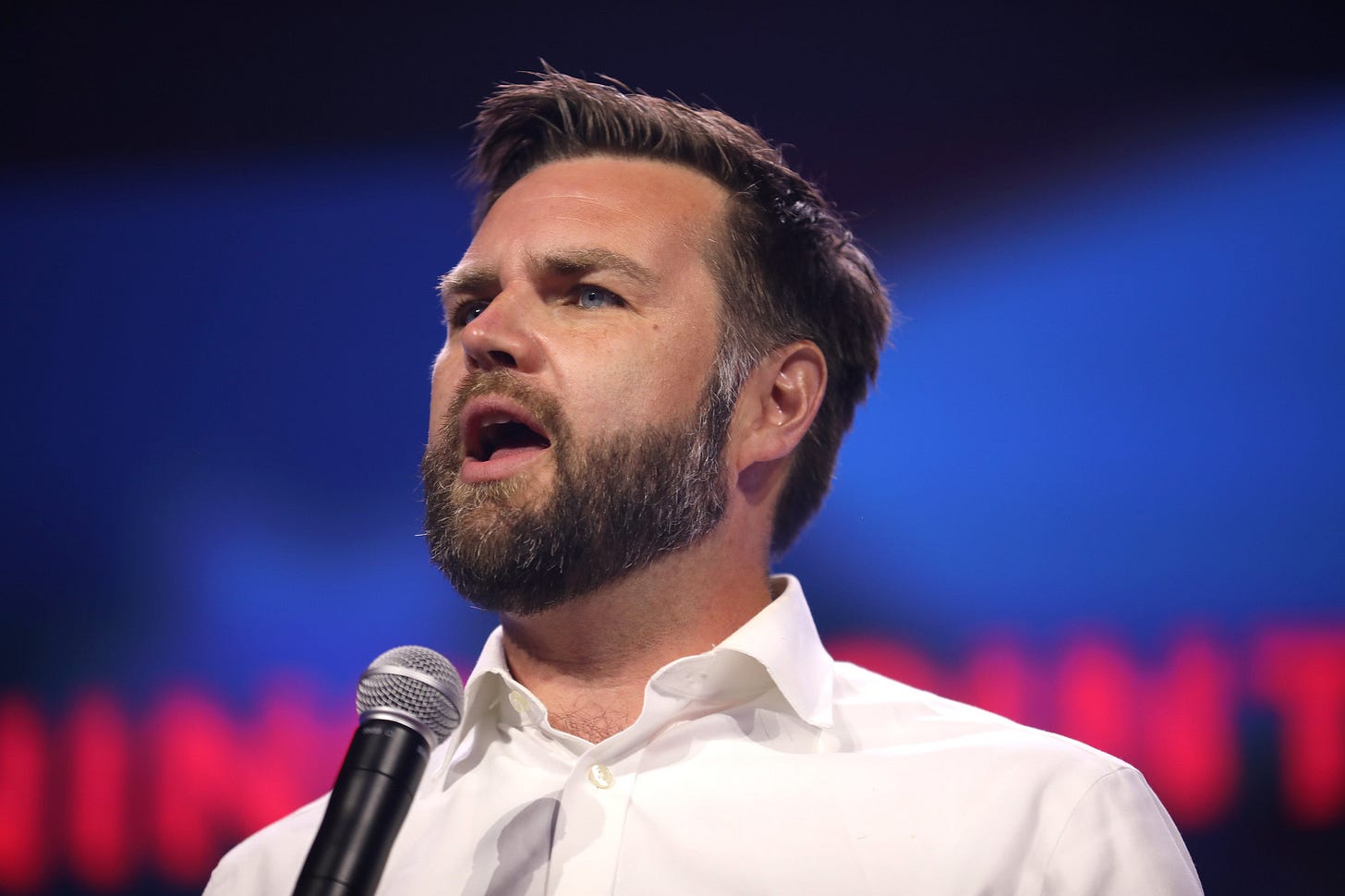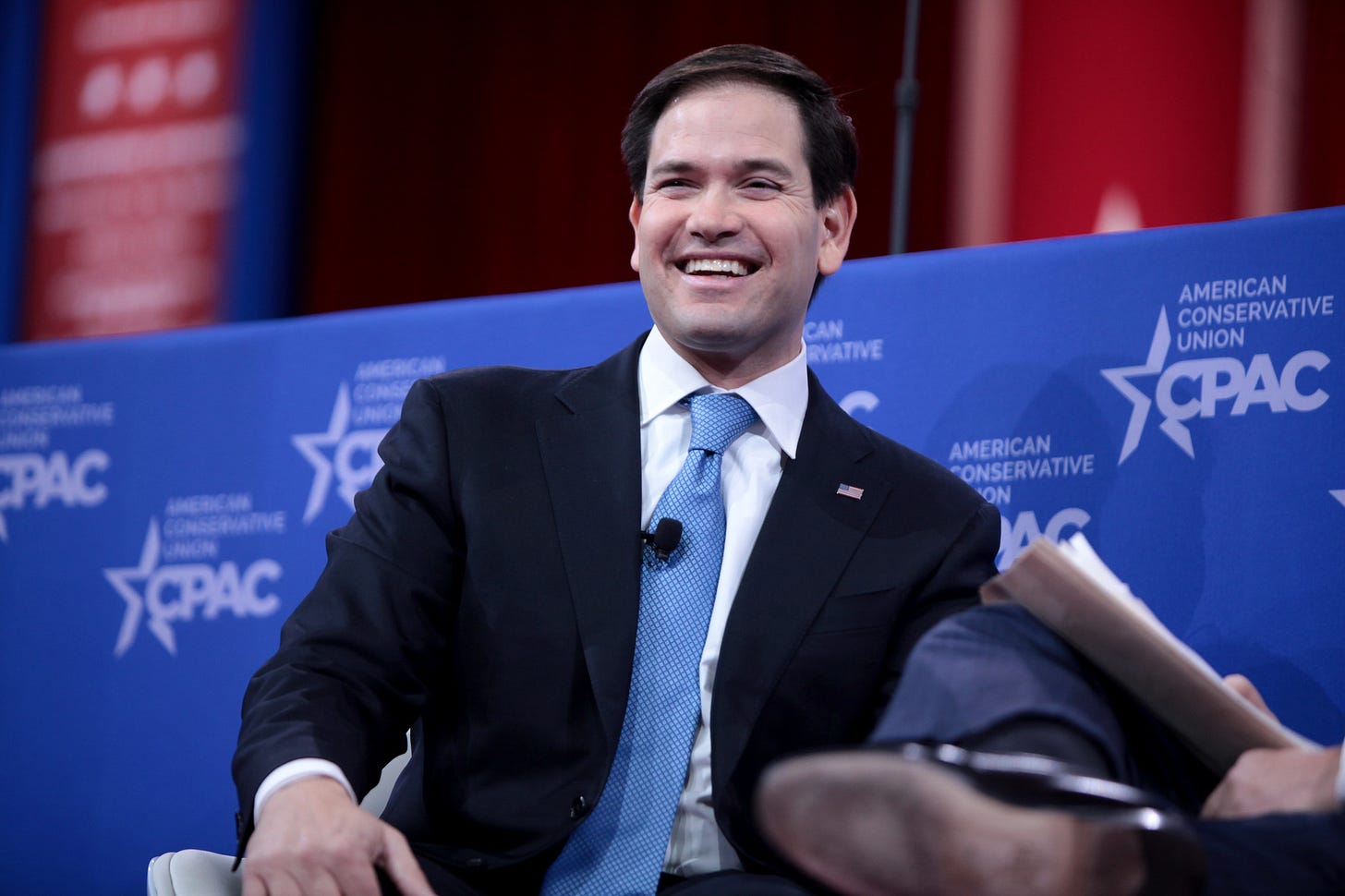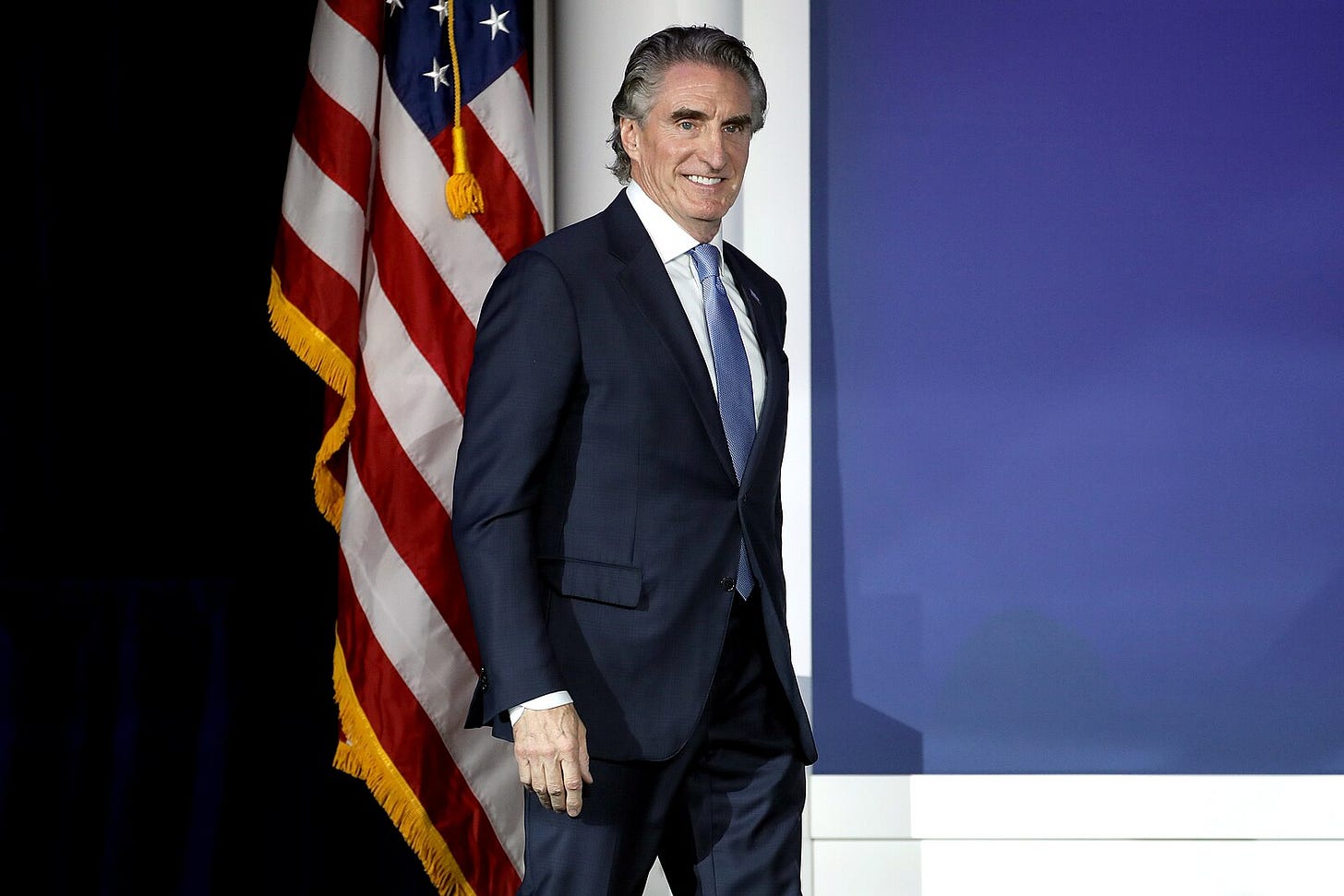Your guide to Trump’s VP shortlist
The pluses and minuses of the top three contenders.
Good morning! It’s Monday, June 24, 2024. Election Day is 134 days away.
It’s going to be a busy week in politics, between tomorrow’s pricey primary in New York’s 16th district, Wednesday’s release of new Supreme Court opinions, and Thursday’s high-stakes debate between Donald Trump and Joe Biden. I’ll be covering all that as it happens. But, first, let’s talk veepstakes:
Donald Trump told NBC News this weekend that he already knows who his running mate will be.
Reporter: “Have you decided who your vice president is?”
Trump: “In my mind, yeah.”
Reporter: “Do they know?”
Trump: “No, nobody knows.”
We may not know who he’s selected — but several news outlets have reported that a short list of three top contenders has emerged: Ohio Sen. J.D. Vance, Florida Sen. Marco Rubio, and North Dakota Gov. Doug Burgum.
Who are each of these three men, and what would they bring to the ticket? Here’s your guide to Trump’s VP short list.
The populist convert
J.D. Vance
Age: 39
Education: Ohio State (BA), Yale (JD)
Background: Served in the Marine Corps during the Iraq War, worked in venture capital under Peter Thiel and Steve Case, published a bestselling memoir about his Rust Belt upbringing, elected to the Senate in 2022
Biggest boosters: Donald Trump Jr., Tucker Carlson, Steve Bannon
Sometimes, presidential candidates aim for ideological balance when selecting a running mate. Think conservative Ronald Reagan choosing moderate George H.W. Bush in 1980, or moderate John McCain elevating conservative Sarah Palin in 2008. Other times, candidates try to double down, seeking ideological consistency with their No. 2, such as Bill Clinton tapping his fellow “New Democrat,” Al Gore, in 1992 or Joe Biden declaring that he was “simpatico” with Kamala Harris in 2020.
Out of the contenders on the short list, Vance is the closest thing Trump has to an ideological soulmate.
Of course, it wasn’t always that way. Vance first rocketed to political fame as the author of “Hillbilly Elegy,” his account of the poverty and social isolation of communities like the one where he grew up in Ohio. The book, published in June 2016, became popular as a guide for liberals to the frustrations among white working-class voters that helped elect Trump later that year — but, crucially, Vance was regarded at the time as a narrator of Trumpism, not someone of Trumpism.
In fact, during the 2016 campaign, Vance publicly called Trump “reprehensible” and “noxious” and privately referred to him as “America’s Hitler.” Vance warmed to Trump over the course of the latter’s presidency; by the time he was elected to Congress in 2022, in no small part because of Trump’s endorsement, Vance was seen as one of the Senate’s leading exponents of Trumpian populism.
Vance, like Trump, centers working-class voters in his rhetoric; at 39, he is part of a new generation of Republican lawmakers (along with peers like 44-year-old Josh Hawley) who is more comfortable clashing with business interests and Wall Street than cozying up to them. He also echoes Trump’s isolationist foreign policy, emerging as a key congressional critic of sending aid to Ukraine.
Boating little legislative experience, Vance has yet to sponsor a bill that has become law — although, interestingly, many of his most notable proposals have come from working across the aisle. Vance has sponsored bills targeting bank executives with Sen. Elizabeth Warren (D-MA), bolstering railroad regulations with Sen. Sherrod Brown (D-OH), and fostering competition in the credit card industry with Sen. Dick Durbin (D-IL). In a recent New York Times interview, Vance said the “the people on the left…whose politics I’m open to” are Bernie Sanders supporters.
Bottom line: Vance offers little to old-school conservatives who might not be thrilled about a third Trump nomination, but he would bring a well-articulated version of Trump’s populism to the ticket. As Axios recently noted, as a Rust Belt native turned Yale Law-educated venture capitalist, he is uniquely comfortable selling Trumpism both to rural, working-class voters and to college-educated suburban voters. 40 years Trump’s junior, he would also bring youth and vitality to a general election campaign that has noted for lacking those qualities on both sides.
The political veteran
Age: 53
Education: University of Florida (BA), University of Miami (JD)
Background: Born to Cuban immigrants in Miami, worked in local Florida politics before eventually becoming a Jeb Bush protégé in the state House, joined the Senate in 2010 as a Tea Party star, ran for the GOP presidential nod in 2016
Biggest boosters: Kellyanne Conway, Sean Hannity
Rubio may still seem like a fresh face, but compared to Burgum (who was first elected to political office in 2016) and Vance (whose first campaign was in 2022), he is the only VP contender whose political career pre-dates Trump’s — and does so by almost two decades, in fact.
In that time, Rubio, like Vance, has also evolved quite a bit. The Floridian’s first brush with Trump came in 2016, when the two ran against each other for the Republican presidential nomination. Heading into the campaign, Rubio had been seen as the future of the GOP (“The Republican Savior,” a Time magazine cover famously called him) — a future that, like everyone else’s, ran headfirst into Trump’s sturdy wall of support.
During the 2016 primaries, Rubio was the Trump rival who went after him in perhaps the most personal terms, not only calling him “erratic” and a “con artist” but also targeting the size of his, well, you remember. His attempts to out-Trump Trump did not go well, and he eventually dropped out after coming in second in the primary in his own home state.
Banished back to the Senate, Rubio ultimately went on an ideological journey attempting to meld his Tea Party conservatism with Trump’s populism. His resulting campaign against “woke capital” has included an endorsement of a unionization effort at an Amazon warehouse, a rare move for a Republican, and teaming up with Vance on a bill to create a “collective bargaining system” that allows workers to avoid “woke union leadership.”
Rubio, a member of the Senate Foreign Relations Committee and the top Republican on the Senate Intelligence Committee, is the VP contender with the most foreign policy experience. During the Trump administration, he was referred to as the “virtual secretary of state for Latin America,” influencing Trump’s push to remove Nicolás Maduro in Venezuela. However, Rubio’s more hawkish brand of foreign policy isn’t exactly a perfect fit for Trump’s: earlier this year, he championed a bipartisan provision blocking a president from withdrawing from NATO without congressional approval, which was widely seen as aimed at Trump himself.
Notably, although Trump’s longer list of vice presidential contenders featured several women and people of color, Rubio is the only non-white-man to make it on the short list. Republicans are hoping to make big gains among Hispanic and Latino voters in 2024, and elevating Rubio — a Cuban-American — could be a boost for those efforts. Noting that Rubio would offer Latinos something no other candidate has before — the chance to “vote for one of their own to be a heartbeat away from the presidency” — former Biden aide Michael LaRosa wrote in an op-ed this weekend that Rubio is the VP contender who Democrats should fear the most.
Technically, Rubio’s selection would spark a constitutional issue: per the 12th Amendment, if presidential and vice presidential candidates are from the some state, they can’t win that state’s electoral votes, and Trump can’t exactly give up Florida’s 30 electors. But Trump, who would likely enjoy turning his former rival into a submissive underling, has an easy fix for that. Rubio could simply move, Trump has reportedly told associates, despite the fact that Rubio is the one who is a sitting Florida senator and Trump has homes in two other states.
Bottom line: Rubio has the most electoral experience of any potential running mate — but those credentials could cut both ways, since Trump will have to forgive their past clashes and their differing views on some issues. However, constitutional issues aside, Rubio would allow Trump to make inroads with an important constituency that would provide a major boon to his campaign, and add some foreign policy heft to the ticket.
The ultimate understudy
Doug Burgum
Age: 67
Education: North Dakota State (BA), Stanford (MBA)
Background: McKinsey consultant who took a software company public and eventually sold it to Microsoft for $1.1 billion, then used the money to bankroll a 2016 campaign for North Dakota’s governorship and a doomed presidential bid in 2024
Biggest boosters: Rupert Murdoch
An understated Midwestern governor who is unlikely to overshadow Trump? Burgum is Trump’s closest available approximation of Mike Pence if he wants to recreate the running-mate strategy that won him the presidency in 2016. (Of course, he also might not want to recreate the Pence strategy, considering how that relationship ended up.)
Burgum is a pick who would be simultaneously fairly vanilla and somewhat out-of-the-box, but he checks a few key boxes for Trump. We know Trump prizes candidates who look like they’re out of “central casting,” and he has apparently blessed Burgum with that designation. We also know Trump is most comfortable around people who are his economic and generational peers: Burgum is a fellow retirement-age millionaire, which could help bolster a relationship between the duo. Finally, we know Trump doesn’t want a running mate who will steal the spotlight from him. There is little worry of that from the governor of America’s fourth-least-populous state.
When I think of the possibility of Burgum as VP, I keep going back to a piece I wrote more than a year ago, when Burgum entered the 2024 Republican presidential primaries. The piece, titled “Why not run?”, was framed in response to a question I had been receiving a lot from readers: why were long-shot candidates like Burgum even running for president? The answer, I wrote, was that “if you’re an ambitious politician with little to do…there really isn’t much downside to launching a bid for the White House” — and there is a whole lot of upside. Sure, maybe your bid flames out, but at least you’ll have boosted your name ID, maybe enough to land a book deal or TV contract, or a Cabinet slot or even the vice presidency.
If Burgum becomes Trump’s running mate, there will perhaps be no better proof of the “Why not run?” philosophy. Simply by throwing his hat in the ring (and burning $12 million of his own money), Burgum was able to buy enough name recognition that he might level-up from being an unknown governor to a heartbeat away from the presidency. An impressive trajectory.
In all seriousness, even though he putatively ran against Trump earlier this year, Burgum is easily the VP shortlister with the slimmest history of anti-Trump comments. Burgum told an interviewer last year that he wouldn’t join a business venture with Trump, but that’s mild stuff compared to Vance and Rubio’s comments. (It is somewhat interesting that two of Trump’s three top options vocally criticized him in the past.) In 2016, however, when Rubio and Vance were dithering on Trump, Burgum was emphasizing that they were two outsider businessmen entering politics, a message Trump will like.
Bottom line: Burgum is the low-risk, low-reward pick. Considering the North Dakota vote (and tech-bro vote) is in the bag for Trump, there’s no clear constituency Burgum would appeal to — but he’s someone Trump appears to be comfortable with, and picking him would allow Trump to avoid the awkward news cycle of pundits repeating all the negative things a Rubio or a Vance said about their new running mate in the past. The most memorable moment of Burgum’s presidential campaign was his giving away $20 gift cards to donors — which tells you two things: a) there’s little danger that he will overshadow Trump and b) he has some serious cash he can kick into the campaign.
Of course, this is Trump, so the shortlist could change as time goes on.
Other contenders on his longer list of possibilities reportedly include South Carolina Sen. Tim Scott, Florida Rep. Byron Donalds, New York Rep. Elise Stefanik, Arkansas Sen. Tom Cotton, and former Housing and Urban Development Secretary Ben Carson.
But — at least right now — Vance, Rubio, and Burgum appear to occupy the top tier of Trump’s potential running mates.
Trump is reportedly still deciding when to announce his No. 2. Per NBC News, he is considering doing so immediately after his July 11 sentencing, in order to disrupt the news cycle — or before the sentencing, to ensure that both the sentencing and the VP announcement receive separate fundraising boosts.
The pick will have to come some time in the next few weeks, since the Republican National Convention kicks off in Milwaukee on July 15.
More news to know.
Politico: Trump keeps flip-flopping his policy positions after meeting with rich people
NYT op-ed: “Not a single Fortune 100 chief executive has donated to [Trump] so far this year, which indicates a major break from overwhelming business and executive support for Republican presidential candidates dating back over a century, to the days of Taft and stretching through Coolidge and the Bushes, all of whom had dozens of major company heads donating to their campaigns.
CNN: Pennsylvania Gov. Josh Shapiro is “the first American governor ever to have a kosher kitchen prepared in an executive mansion.”
Daybook.
White House: If you’re wondering how important Thursday’s debate is, look no further than President Biden’s schedule. He has been holed up at Camp David since last Thursday, and he has no plans to leave until he flies to Atlanta for the showdown. Once again, Biden has no public events on his schedule today while he continues debate prep at the presidential retreat.
That leaves Vice President Harris to represent the administration on the second anniversary of the Supreme Court’s Dobbs decision, which is today. Harris will mark the anniversary with campaign events at the University of Maryland in College Park, Maryland, and in Phoenix, Arizona.
Secretary of State Antony Blinken will meet with Israeli Defense Minister Yoav Gallant, amid rising tensions over Prime Minister Benjamin Netanyahu’s claims that the U.S. is delaying arms shipments meant for Israel.
Congress: The Senate is out until July 8. The House is out until tomorrow.
Courts: The Supreme Court will release its next opinions on Wednesday. In Fort Pierce, Florida, Judge Aileen Cannon will hear arguments in Donald Trump’s claim that Special Counsel Jack Smith’s position is unconstitutional.






Two of the three are Catholic. Is that good or bad for Trump moving forward
You may be right, but in my view Nicky Haley remains his best choice. Her 25% in Iowa, 33% in Colorado, and 40+% in Utah, plus 12% in New York, show, at least to me, that a chunk of the Republican electorate or Democrats voting in Republican primaries want to push someone else and show their discontent with Trump.
She has done what was needed, suspended her campaign, then waited what ten weeks, before endorsing Trump, and since then it has been radio silence. Yet she still pulls votes, enough to be a ballast, that could well propel him to the Presidency.
No matter who else he picks, they have not shown that total lack of bowing down to and kissing the ring, that she has. That is a form of strength which will make attacking her even harder.
Glad to have found you again, not sure how to get you in my substrack morning set, but typing you in is no great problem either. Thought you had taken a break. Good luck with your venture, and congratulations on your subscriber totals.